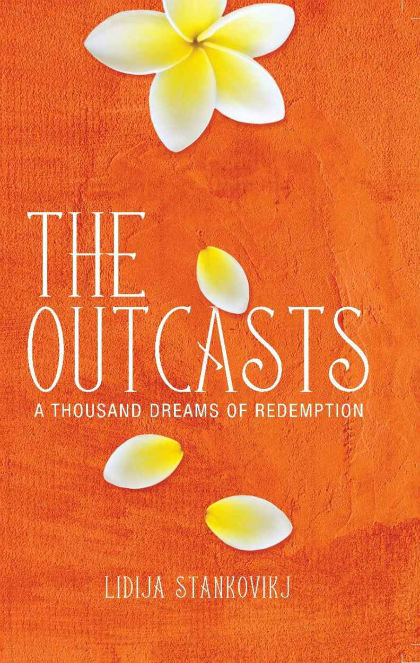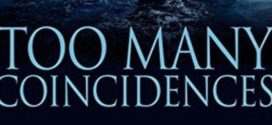How often do we wonder that if we had the chance to live our life all over again, with the wisdom we have gained so far, how different would it be? Will we take a different course? Will we avoid making what we consider mistakes and make some different ones? And at the end of it, will we still be the same person and end up in the same place?
Most people would probably not trade off a lot of things they have done in life, but we all would probably like to have more wisdom and understanding. These are the areas where books like the Secret series, or works of Paulo Koelho hold their appeal, as they discuss these questions that everyone comes across in life no matter where they live in the world or what language they speak. It so easily overlaps with the mystical territory of religions and philosophies highlighting their similarities and objective of achieving well-being for everyone.
| Book Title | : | The Outcasts (A Thousand Dreams Of Redemption) |
| Author | : | Lidija Stankovikj |
| Publisher | : | Leadstart Publishing (2019) |
| # of Pages | : |
196 (Paperback) 868 KB 237 (Kindle EBook) |
| Purchase Link(s) | : |
These were the thoughts stirred by the title and contents page of the book “The Outcast – A Thousand Dreams of Redemption. The tile is followed by a quote: “If only life could be lived twice – first as a mystery, and then as beauty.”
A classic, rich, red background shows off the elegance and simple beauty of a small white flower and a few scattered petals. A simple and inviting cover page which is suitable for the content.

The Outcasts – A Thousand Dreams Of Redemption By Lidija Stankovikj
Published by Platinum Press (Leadstart Publishing), this book is written by Lidija Stankovikj, who combines the heritage of a Serbian father and a Macedonian mother. She has lived and worked in many countries and has made Bangalore her current home with Indian husband – a real multi-cultural personality :). And so the book also brings together a lot of cultural aspects and traditions through its characters. Let’s take a look. But before that, let me share with you that the publisher has provided us the copy of the book in exchange of an honest and unbiased book review.
Divided into 4 parts called: Awakening, The Journey, The Arrival and The Return – the content page itself gives you a fair idea of what to expect.
We first meet Tabassum aka Tabu, a young woman whose family is worried that she is possessed by jinns and so has brought her to a Dargah for cure. Tabu believes that her husband has divorced her and so when she is freed from the chains, she escapes the village.
Santan is an old man who was brought to the holy city to die. Instead, he has regained his vitality and now he must also make a journey to tie some loose ends from his past.
Chameli is a transgender – a hijra – who has lived his life going from one certainty to other – always on other people’s directions and whims. When in spite of all her efforts, her guru dies of an illness and the responsibilities of the clan are thrown onto her, asking her to sacrifice her whole life, she leaves everything she has known in a quest to find herself.
Fate brings these three misfits together on this journey. They recognize some part of the unspoken need they have inside themselves, in the other two and so they travel together. Supporting each other through troubles and discoveries, they eventually end up in Santan’s old village.
Here, they learn about the wheel of time and how the village has transformed itself in the last few decades. They learn the complete and incomplete life stories of its residents, each full of learnings and pearls of wisdom.
Have they finally found their place in the world where they can belong? Or a quest for redemption is meant to remain unfulfilled?
This Is Here In For You
Views And Reviews:
Reading this book is like walking through a maze, where with each new turn you discover a new flavour as you go through references from Islam, Hinduism, Sufi stories, folklore, and mythical tales, and learn a bit more about each character. Whether it is Tabu’s propensity to seek love through Abhi and then her husband, or Santan’s thirst for life or Chameli’s desire to be loved for who she is. Through the kaleidoscope of their actions and emotions, we see the world around them, caught between the present and the past, between the modern era and the traditions, often repressing for people who live in it, but also able to provide life-sustaining support through its wise men.
But the central theme very clearly speaks to everyone, because all of us has felt like a misfit and some point and at someplace in their lives.
When you approach a new culture, a new way of life, these discrepancies are very obvious, but even in the all familiar place called home and within the boundaries of our lives, no matter how sheltered they may be, there are times when you feel like no one understands you and you are not able to make your loved ones see your vision, whether it is a matter of marrying a girl of your dreams or pursuing a line of work that is radically different. But, if you think about it, if everyone feels a misfit at some point, maybe we all share a lot more similarities than we think. And life can be so much better if we would just see the other’s perspective as often as we see ours.
This seemingly simple philosophical thread is visible throughout the book, but the author has added the background of exotic elements containing dargahs, holy cities, caves and traditional symbolism contained in the tales of Indian to Middle Eastern cultures including silk, ittar-making, pomegranate orchards, sadhus and fakirs, jinns and angels and a lot more.
First few pages contain a lot of footnotes explaining what some of the Indian terms mean, but once you are introduced to all three main characters, you step right into this world. Since every tradition values its practices and tales, some people may find problem(s) with religious references.
Being a story of quest for redemption, the book is filled with many quotes and thoughts worth sharing. So, here are a few that we liked.
If you are familiar with the concept of mental illness being treated as possession of the body by evil spirits, you’ll see the logic of this practice being questioned below:
If God had created man from clay and jinn from fire, how could one imprison jinn in a pot, sealing him in a handful of soil? Was it a trick to make him believe he was residing in a human, luring him into embracing his own imprisonment?
Most of the times, our shackles are of our own making, whether it is expectations in the short term or fear of death in the long term:
To help those who are feebler than you and then expect only the sweet fruits of gratitude, is a mark of egotism.
— —
Why is death so important to you? Isn’t your happiness today far more important than any other idea of the past or any other event in the probable future?
And it is upto us to break these limitations and explore our self-worth:
The desperate man seeks a solution under each stone and behind every door. The only place he fails to examine are the feral corners of his own hear. There, under the cultivated pride, lies the fervour of youth, silenced by the manners of this world.
— —
Children always seek answers from their parents. But they remain engaged in their game until the day they outgrow it. We all ask questions, but we are seldom ready to disconnect from this illusion of stability.
There is a story in Mahabharata about how Yudhisthir couldn’t find a single bad person in the whole world, and Duryodhana could not find a single good person. Jaisi Drishti vaisi shristi…
The para below highlights the same:
The mind which is corrupt always sees the worst in everything. You see a man, and behind each of his words and actions, you suspect selfish intentions. This inclination has nothing to do with the person you judge; your perception is a reflection of your urge to act selfishly. An innocent soul can never anticipate crookedness. And when script says this world is just an illusion, a mere creation of the mind, this is one of the meanings. Be pure, and you will see purity; be negative, and darkness will follow you.
I liked how in addition to the philosophical musings, the author has picked up the practical tone of the world in which these characters live, e.g.,
People set bhajans as ringtones on their cell phones. Dargahs accept online donations. Temples offer virtual pujas and darshans. Holy people of all spiritual paths open stores selling everything from herbal medicines to amulets.”
After all, life is what you make of it yourself.
— —
You can blame anyone and anything for everyone and everything, since all spoken and silent matters on this earth are connected.Or you can stop blaming others and look inside your own heart. Every quest has to start somewhere…
Lidija Stankovikj has created this lovely little set of characters with their vulnerabilities and given them this fairy tale journey with its ups and downs, while they learn to live.
Summary:
The book is worth reading if you enjoy books with a quest for spirituality and meaning of life. At 194 pages, it will take you only a few hours, but there are bound to be some sections that you’ll find are worth savouring.
Quick Purchase Links:
- Buy Book From Amazon India – Paperback
- Buy Book From Amazon India – Kindle Ebook
- Buy Book From Amazon US – Paperback
- Buy Book From Amazon US – Kindle Ebook
If you already have read the book do share your remarks and thoughts via comments below. Does this review help you in making your decision to buy or read the book? Do not forget to share this article with your friends over various social networks via Twitter, Facebook and others. And yes, you may like to subscribe to our RSS feeds and follow us on various Social networks to get latest updates for the site to land right in your mail box.
 ThinkerViews – Views And Reviews Personal views and reviews for books, magazines, tv serials, movies, websites, technical stuff and more.
ThinkerViews – Views And Reviews Personal views and reviews for books, magazines, tv serials, movies, websites, technical stuff and more.



